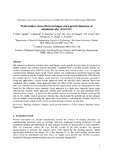JavaScript is disabled for your browser. Some features of this site may not work without it.
| dc.contributor.author | Liljedahl, C. D. M. | - |
| dc.contributor.author | Brouard, J. | - |
| dc.contributor.author | Zanellato, O. | - |
| dc.contributor.author | Lin, J. | - |
| dc.contributor.author | Tan, M. L. | - |
| dc.contributor.author | Ganguly, Supriyo | - |
| dc.contributor.author | Irving, Phil E. | - |
| dc.contributor.author | Fitzpatrick, M. E. | - |
| dc.contributor.author | Zhang, X. | - |
| dc.contributor.author | Edwards, L. | - |
| dc.date.accessioned | 2011-11-13T23:21:11Z | |
| dc.date.available | 2011-11-13T23:21:11Z | |
| dc.date.issued | 2009-06-30T00:00:00Z | - |
| dc.identifier.issn | 0142-1123 | - |
| dc.identifier.uri | http://dx.doi.org/10.1016/j.ijfatigue.2008.05.008 | - |
| dc.identifier.uri | http://dspace.lib.cranfield.ac.uk/handle/1826/5067 | |
| dc.description.abstract | The interaction between residual stress and fatigue crack growth rate has been investigated in middle tension and compact tension specimens machined from a variable polarity plasma arc welded aluminium alloy 2024-T351 plate. The specimens were tested at three levels of applied constant stress intensity factor range. Crack closure was continuously monitored using an eddy current transducer and the residual stresses were measured with neutron diffraction. The effect of the residual stresses on the fatigue crack behaviour was modelled for both specimen geometries using two approaches: a crack closure approach where the effective stress intensity factor was computed; and a residual stress approach where the effect of the residual stresses on the stress ratio was considered. Good correlation between the experimental results and the predictions were found for the effective stress intensity factor approach at a high stress intensity factor range whereas the residual stress approach yielded good predictions at low and moderate stress intensity factor ranges. In particular, the residual stresses accelerated the fatigue crack growth rate in the middle tension specimen whereas they decelerated the growth rate in the compact tension sample, demonstrating the importance of accurately evaluating the residual stresses in welded specimens which will be used to produce damage tolerance design data. | en_UK |
| dc.language.iso | en_UK | - |
| dc.publisher | Elsevier Science B.V., Amsterdam. | en_UK |
| dc.subject | Damage tolerance Fatigue crack growth behavior Crack closure Residual stress Eigenstrain x-ray-diffraction neutron | en_UK |
| dc.title | Weld residual stress effects on fatigue crack growth behaviour of aluminium alloy 2024-T351 | en_UK |
| dc.type | Article | - |
Files in this item
This item appears in the following Collection(s)
-
Staff publications (SAS) [907]
